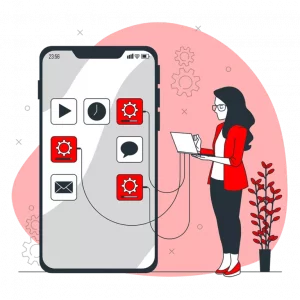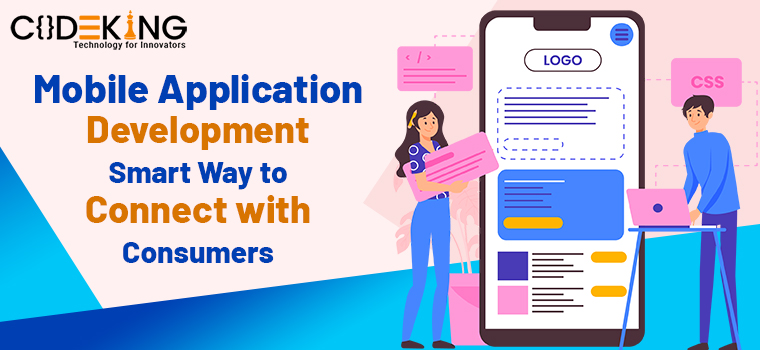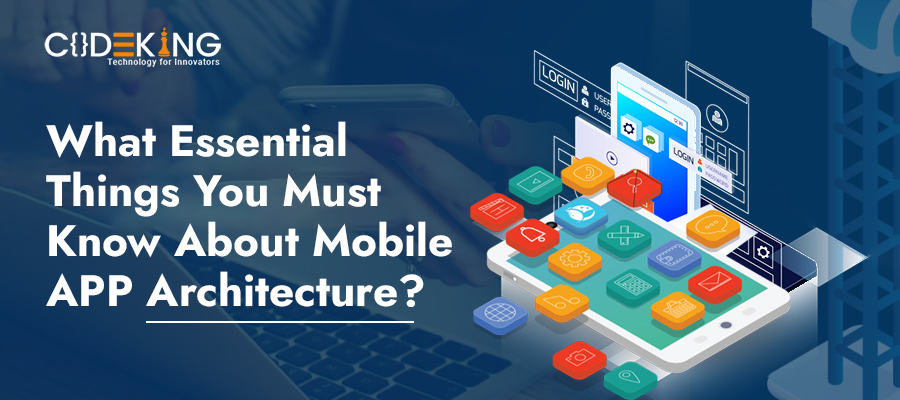All around the world, there has been exponential growth in the demand for mobile applications. From small-scale to large-scale businesses need mobile apps to reach out to people. It is convenient to stay connected. The focus is to develop a user-friendly mobile application with proper UI and UX. Due to the increase in the use of smartphones widely around the world, mobile applications need to be produce to meet your business goals.
With the improvement in micro-processing tools, mobile apps can run on multiple platforms. In the future, it is predicted that mobile applications developed on Flutter or React native will work on phones running android or iOS, or Macs. More than four billion people across the globe use smartphones. These numbers are bound to increase dramatically shortly. Statistics show no signs of slowing down and confirm numbers are growing steadily. This is a booming industry with a lot of opportunities.
On average a person checks there at least every hour. People spend 90% of their screen time using mobile apps. On average a person has at least 30 apps installed on their smartphones. The data is encouraging those who wish to develop a mobile app. There are more than 1.5 million applications on the Google Play Store and Apple App Store. We would discuss the process for mobile app development in detail.
Mobile app development – Process in detail

The process of creating mobile applications that run on smartphone devices is known as mobile app development. These apps are either downloaded or pre-installed and can put in place later by the smartphone user. They use the network abilities of the gadget to enable the working of the app remotely. Therefore, the mobile application needs designing software that can be transfer on the device. Followed by installation infused with backend services for the access of data through a programming interface. The ultimate step is to evaluate the application on target devices and get feedback. This is important to know whether the application is free of bugs or requires further improvement.
Prerequisites for Mobile app development
To design mobile apps, you need to consider a few things. These are
-
Screen sizes
-
Hardware requirements
-
Software requirements
-
Android or iOS
-
Mobile development platforms
-
Selecting Prototypes
Development Platforms
Two forms of development platforms are widely utilized. They are the Google Android system and the Apple App store. But nowadays different development approaches to designing applications are gaining popularity those are
-
Native Apps
They are developed using software development kits and tools. These SDKs are provided by the platform owners like Google and Apple. These applications would established on your chosen platform. They have the best runtime performance. They directly use the data of the platform through SDKs. The features to be protect in the app are dependent on the platform. The developing cost is quite high as different codes are developed for each platform.
Selecting this development method enables you to use the native capabilities of the platform. You can easily access the hardware abilities of the mobile like GPS, and camera which helps in faster execution of features. As a result, a rich user experience is developed very quickly and easily. Push notifications are executed very easily on this development tool. As the code is built in the native language, it offers fewer bugs.
-
Cross-platform native applications
These mobile apps are grow in various programming languages. These are assemble separately for each platform. A single base code can be utilized for different platforms. Similar user experience is expand for different platforms. The codes in these types of applications must be assemble from third-party open-source libraries.
Smartphone users are divided about 50-50 between android and iOS. Your prospective client could be on any one of the platforms or both. So, developing separate apps for both platforms requires vast amounts. The companies do not have sufficient budgets to manage this. Selecting cross-platform development comes in handy. It offers user experience across both platforms with a single development team. This method is economical and saves a lot of time in the maintenance of apps.
-
Hybrid mobile applications
These applications are grow using updated web technologies like JavaScript, and CSS. These are compiled and developed as mobile applications for the chosen platforms. These apps work using web containers with browser runtime. The codes are divide between web and mobile apps. They are developed using tools for web development. They do not require any support from native gadgets.
-
Progressive Web applications
These apps do not require any app store installation or traditional methods of app channels. They work conveniently in the browser, mobile, or desktop. These just require a link that is attach to the mobile or desktop in the form of an icon. These apps run on mobile as well as on the web. You need not install these apps. They run through browsers using the URL. They are dependent on network connections. If the connection to the network is old, interactivity is not available to a great extent.
These apps are grow using traditional languages such as JavaScript, CSS, HTML, and so on. They are easily accessible through browsers only. It is app advocate to use these apps only if the three is stable network connectivity. These apps do not require any native capabilities of devices like location, camera, GPS, and many more.
Steps for building a mobile app
For having a well-developed mobile application, you need to follow certain steps which are crucial for the best results. Those are as follows:
-
Developing an idea and strategy:
You need to have a defining strategy. You should be able to answer the following questions to begin the process:
-
Why are you creating an app?
-
What’s the motto of your app?
-
What is your target customer?
-
What is your business model?
-
How is your app helpful to the industry?
-
Is the USP of your app?
-
What is your revenue model?
-
What is your budget for building mobile applications?
-
You should define the purpose of your app. Most importantly, identifying the app’s potential or target clients.
-
Planning with researched analysis
Once a strategy is built, you can achieve your goals easily with proper backup. It should begin with an analysis of the market. Clearly define the functionalities of the app with the functional requirements. Here planning is important to know your output. You need to make a list of priorities with clear delivery milestones. Select the user development platform according to your budget.
- Various operating systems need unique technology methods. You need to hire developers as per your selected mode of the development platform.
-
Testing:
Before your app goes live, you need to check its viability. You should know its actual working process. The testing allows you to check bugs, and glitches, that need to be shift off before it is in the hands of your potential customers. The following methods can be grab up as follows:
-
A feedback form with relevant QAs to be grow at each step
-
The app needs to be tested on both platforms
-
Different devices to be taken into consideration
-
Test to be conducted with the real user to provide true feedback
-
The designing process of mobile application
The design is all about understanding the product and developing its capabilities, functionalities, and features. The end-user must be always kept in mind while designing an app. It should have a strong UI and UX. It starts with building user flow/diagrams and creating wireframes. Then followed by choosing designs from different patterns, palettes, and elements. Gearing up for mock-ups and ready to change the design based on user feedback.
Deciding on the budget for mobile application development

The mobile app development industry is expanding on a large scale. Apple App store and Google app store daily register more than a thousand apps per day, and the coming days look even brighter. The cost depends upon the features and your budget. Here is the list showing the range of amounts per each type of app:
-
Offline application cost ranges between $12,000 and $25,000
-
An application that has moderate network connectivity ranges between $5,000 and $45,000
-
Application developed with a chatbot ranges from $20,000 to $50,000
-
IoT App cost ranges from $20,000 to $60,000
-
Application with an automated messaging system ranges between $30,000 and $70,000
-
Application with the features of Virtual reality or augmented reality ranges between $40,000 and $70,000
-
E-commerce app cost ranges between $30,000 and $80,000.00
-
On-demand cost of application development ranges from $50,000 to $100,000
-
Mobile app promoting your business ranges between $50,000 and $120,000
-
Social networking mobile application development ranges between $30,000 and $90,000
-
Start Application costs around $40,000-$400,000
-
Taxi application around $50,000-$400,000
-
Game applications with the features of AR / VR around $60,000-$250,000
-
Retail Application ranges between$50,000 $150,000
Many factors affect the price, varying on the complication of the app development, at 40$ per hour, the typical cost would be:
-
Simple Application Development Cost from $40,000 to $60,000
-
Average Application Development Cost from $60,000 to $150,000
-
Complex App Development Cost – from $300,000
It is very important to understand that the rate would vary depending upon the
-
programming language of the application development (Swift, Java, Kotlin, PHP, JavaScript, Golang)
-
the complexity of the project, the specialists involved (programmers, testers, scrum master, business analyst, project manager)
Influences that determine Application Costs
How much it amounts to develop an app depends on three things:
-
The application’s complexity levels
-
Design and Structure
-
The platform on which the application will run
Categorization of applications based on complexity
The tinier and easier the application, the less time you will need for its development. When it comes to the timing of the application development, you must decide on the scale of the upcoming work.
There are three types as follows:
-
Simple apps have the following characteristics:
-
without any added benefits,
-
would possess only the essential features,
-
low-tech screens,
-
the necessary UI solutions.
It comprises basic features, three to four screens, easy functions, and no data storage. Such an application would include login, signup, profile making & editing, search, notifications, messages, and admin panel or dashboard. The budget of a simple app developed would be determined based on a collection of features offered through the app. Examples: of some simple apps are calculator app, time tracking app, notes app, social networks, etc.
-
Mid-level apps have the following features:
-
Slightly complex features,
-
integrations with Application Programming Interface (API),
-
more screens,
-
customized user interfaces,
-
automated real-time messaging.
Some of the extra features that you can add to your mid-level app are social media integration, in-app purchases, payment portals, geo-location, better security, location tracking, and better accessibility. These applications require data storage and more synchronization. With the increases in features and complexity, the cost also increases. Examples of mid-level applications are food delivery applications, taxi apps, and photo-sharing applications.
-
Complex applications would have the following features
-
Multifunctional features,
-
advanced and complicated features such as real-time synchronization,
-
chatbots elements,
-
media processing features,
-
user interface animation,
-
dashboard
-
Visualizations
These apps are grow for vast businesses. The companies use custom integrations with the already available systems. These are custom applications that have usually larger development costs. The cost changes according to the following factors
-
Synchronization of data in more than two devices
-
Online streaming
-
In-app calls
-
Native features
-
Messaging
-
Video chats
Such applications require extensive research and planning of mobile application development. The cost also varies accordingly based on features, research, and planning. The mobile applications demand heavy customizations, for those developers have to write the code for the majority of functions. A few examples of complex applications are enterprise applications, gaming applications, and trading applications
You need to select the developers for your application according to your budget and demands. Let us discuss how you can choose the efficient developers:
Mobile Application Developers
-
Mobile application developers are proficient experts concentrating on app creation services.
-
They customize mobile apps for Android and iOS platforms for businesses of every size.
-
Talk with them about your product and they are ready with an application that would be available on various platforms like the web, and mobile (Android &iOS).
-
You can be covered of a quality solution if you are looking for an application to be introduced across various interfaces.
-
These developers guarantee you that your app would work swiftly and progressively meeting all safety standards. With their personally curated development tools, our team builds software that would satisfy all the needs of clients.
-
They would ensure the expansion of its functions, availability, and usability. We provide solutions to fix the bugs from earlier versions with an appearance upgrade.
-
The developers supply CTA buttons which are very important, and we would discuss them here.
Proper selection of Mobile development companies
No mobile application can be produce perfectly. Due to ever-changing technologies, a mobile application needs to be better and tested regularly. This can be ready by mobile developers as a routine. Mobile developers are well versed with technological advancement to make sure the app is functional throughout without crashing. They are responsible to develop an application that a user can enjoy and recommend further. They update the app and release new versions. The CodeKing develops the mobile application as per your requirement and assures full support. You can browse mobile application development services here. They ensure the best UI and UX experience on your mobile application for your potential clients.





